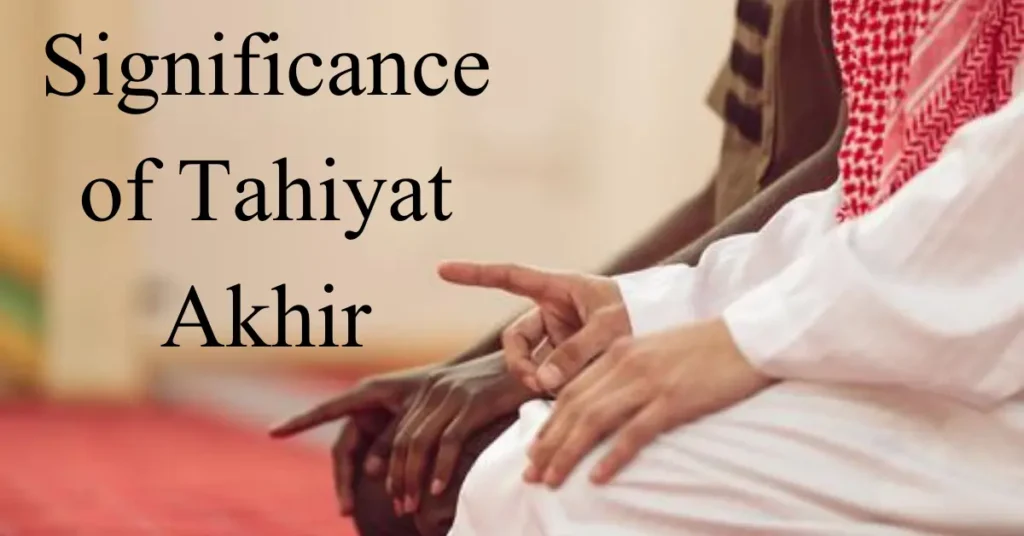Significance of Tahiyat Akhir! In the tapestry of Islamic rituals and prayers, Tahiyat Akhir stands as a subtle yet profound thread, weaving together moments of reflection and spiritual connection.
As Muslims, we engage in various acts of worship, each carrying its own significance, but the essence of Tahiyat Akhir extends beyond the realms of routine. It beckons us to delve into a deeper understanding of our faith, inviting moments of serenity and communion with the Divine.
Join me on a journey as we unravel the layers of meaning behind Tahiyat Akhir, exploring the spiritual elegance that lies within this sacred practice.
You should also recite Tahiyat Akhir rumi by clicking on this link. https://my.brandedpoetry.com/tahiyat-akhir-rumi/
Exploring the Essence of Tahiyat Akhir: A Spiritual Journey
In the hustle of our daily lives, moments of serenity and connection with the divine are like precious gems. Tahiyat Akhir, a simple yet profound practice in Islam, serves as a gateway to such moments. Let’s dive into the heart of this ritual, understanding its significance and discovering the tranquility it brings to our spiritual journey.
1. The Ritual Unveiled:
Tahiyat Akhir is a series of supplications recited in the final sitting of our daily prayers. It’s more than a mere recitation; it’s an intentional pause, a moment to express gratitude, seek forgiveness, and reaffirm our submission to the Almighty.
2. A Conversation with the Divine:
Imagine it as a heartfelt conversation with Allah. In these moments, we praise Him, acknowledge His greatness, and seek refuge in His mercy. Tahiyat Akhir transforms routine prayers into a personal dialogue, fostering a sense of closeness to the Divine.
3. Reflection and Remembrance:
Embedded in Tahiyat Akhir are reflections on the nature of Allah – His attributes and dominion over the universe. It serves as a reminder of our purpose, reinforcing the core principles of Islam and grounding us in a consciousness of the divine presence.
4. Gratitude and Seeking Forgiveness:
Expressing gratitude for blessings and seeking forgiveness for shortcomings are integral parts of Tahiyat Akhir. It’s a moment to acknowledge the blessings we’ve received and humbly seek forgiveness for our inevitable mistakes.
5. Elevating Daily Rituals:
While daily prayers are fundamental to Islamic practice, Tahiyat Akhir elevates these rituals from routine to a source of spiritual rejuvenation. It transforms the mechanical into the meaningful, creating a bridge between the earthly and the divine.
Conclusion:
In the tapestry of Islamic practices, Tahiyat Akhir stands as a beacon of spiritual connection and reflection. It’s a reminder that our prayers are not just rituals but opportunities for profound connection, gratitude, and self-reflection.
As we incorporate the essence of Tahiyat Akhir into our daily lives, we find a richer, more meaningful experience in our journey of faith.
Frequently Asked Questions (FAQs)
1. What is Tahiyat Akhir, and when is it recited in daily prayers?
Tahiyat Akhir is a set of supplications recited in the final sitting of daily prayers (Salah). It’s a moment to express gratitude, seek forgiveness, and connect with Allah. It occurs after completing the main part of the prayer, just before the Tasleem (salutation).
2. How does Tahiyat Akhir differ from other parts of the prayer?
Unlike other prayer components, Tahiyat Akhir is a dedicated time for personal reflection and communication with Allah. It involves praising Him, seeking refuge, and expressing gratitude. It adds a deeper, more personal dimension to the overall prayer experience.
3. Can I recite Tahiyat Akhir in my own words, or is there a specific way to say it?
While certain phrases are traditionally recited, there’s room for personal expressions in Tahiyat Akhir. It’s encouraged to understand the meanings and incorporate personal supplications within the framework. The intention and sincerity matter more than rigid adherence to specific wording.
4. Why is Tahiyat Akhir considered significant in Islam?
Tahiyat Akhir holds significance as a moment of spiritual connection. It serves as a reminder of Allah’s attributes, fosters gratitude, and encourages seeking forgiveness. It transforms routine prayers into a more profound experience, reinforcing the spiritual aspects of worship.
5. Can Tahiyat Akhir be recited outside of the formal prayer times?
While Tahiyat Akhir is traditionally associated with the final sitting of the daily prayers, the essence of its supplications can be expressed outside formal prayer times. The key is to maintain the spirit of connection, reflection, and gratitude throughout the day, fostering a continuous bond with Allah.
